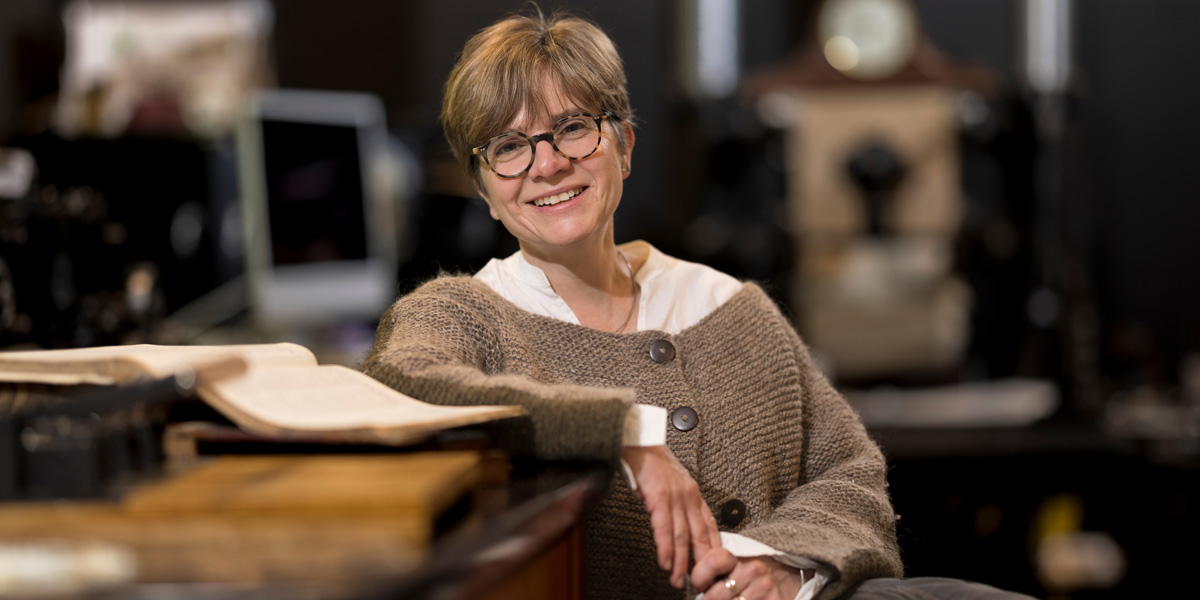Filmmaker Ariana Gerstein named Guggenheim Fellow
Cinema professor to pursue two projects with support from prestigious award

Binghamton University filmmaker Ariana Gerstein has received a 2024 fellowship from the John Simon Guggenheim Memorial Foundation.
“It is humbling and gratifying to be named a Fellow,” Gerstein said. “Honestly, it’s still sinking in, and I realize how much work I have to do. I have long admired work of other Fellows. I did not expect to succeed, as it was my first attempt, but of course I hoped that I would!”
The cinema professor said the award will provide financial support for new creative work over the course of 10 months starting in August. She has tentative plans to complete two projects — a film and an installation — as part of a longer series stemming from an unpublished manuscript by her grandfather Elias Sevillia.
The fellowship supports exceptional individuals in pursuit of scholarship in any field of knowledge and creation in any art form, under the freest possible conditions. The awards are highly competitive; this year’s 188 Fellows were selected from among some 3,000 applicants.
Gerstein earned her bachelor’s degree from Binghamton, where she studied with acclaimed experimental filmmakers Ken Jacobs and Larry Gottheim. She received her MFA from the School of the Art Institute of Chicago and joined Binghamton’s faculty in 1999.
Gerstein’s grandfather, a native of Athens, Greece, who lived from 1905 to 1979, was from a large Sephardic Jewish family with very few resources. The manuscript details his experiences, and those of Gerstein’s grandmother, who had an Austrian and Catholic background, between, during and after major wars and civil conflicts.
“The ensuing work will not be an illustration of the manuscript,” Gerstein said. “Rather the work will be in dialogue with it and an exploration of a process of understanding.”
Philip Carabott, an Athens-based researcher from King’s College London who has contributed to the project, said the manuscript makes for fascinating reading. “The vicissitudes of a veritable Athenian Jewish family, its ups and downs, Elias’ passion for life and his constant quest for starting anew — all are thrown into high relief,” he said. “Wearing my historian’s hat, I consider it a mine of information on a familial and collective level; a candid and thought-provoking testimony.”
Gerstein has also consulted with Gonda Van Steen, chair of Hellenic Studies at King’s College London, on the project. Van Steen wrote a book about the “orphans for sale” history in 1950s Greece and the ongoing repatriation struggle for some of the surviving individuals.
Gerstein contacted Van Steen because of a story in her grandfather’s manuscript about a baby carried by her grandmother on their immigration plane from Athens to New York in 1958. It turns out that this child was one of the so-called orphans and this particular and arduous flight was controversial and highly visible. Princess Sophia of Greece and American actress Jane Russell greeted the plane in New York.
“The baby my grandmother carried was delivered to the actress, and she was paid $5,” Gerstein said. “I have found newsreel footage of this event and Gonda has provided documentation and historical context. I have a lot more to do with researching and developing this story, which potentially connects Greece and America along issues surrounding maternity, politics and economy, within my project.”
Gerstein is interested in using non-traditional methods for making movies outside of the mass market entertainment culture. Doing so, she said, offers opportunities to digress, reconsider, recycle, complicate and slow down — affecting the way we represent our world and our relationships.
Her tools have included desktop scanners and audio interviews. In the coming months, she anticipates creating an experimental documentary with a variety of media approaches — from 16mm film to digital video — with different camera technologies, paper collage and sewn animation on fabric. The installation component will use projection in some way, as does her recent installation titled What We Bring.
“Engaging in an artistic process that allows for distillation, new connections and expression is so important,” Gerstein said. “Media frames an argument and transforms information. “It isn’t just an invisible delivery system. There is no ultimate truth or blank slate.”
Gerstein, who also serves as graduate director of the Cinema Department’s new MFA program, said she has decided not to take the coming year off for the fellowship, although many scholars do. “The new MFA is such an exciting addition to the Cinema Department, I couldn’t imagine not contributing during this important time with our fantastic group of new students,” she said.
Gerstein’s films have been screened at venues such as the Museum of Modern Art in New York, and her experimental documentary work was nationally broadcast on the PBS series P.O.V. She has received awards such as the Gus Van Sant Award for Best Experimental Film from Ann Arbor Film Festival, Golden Gate Award from San Francisco International Film Festival and a Truer Than Fiction/Independent Spirit Award in collaboration with partner Monteith McCollum. Her projects have been supported by the National Endowment for the Arts, a Rockefeller Media Arts Fellowship, the New York Council on the Arts, the New York Foundation of the Arts and the Illinois Arts Council.
